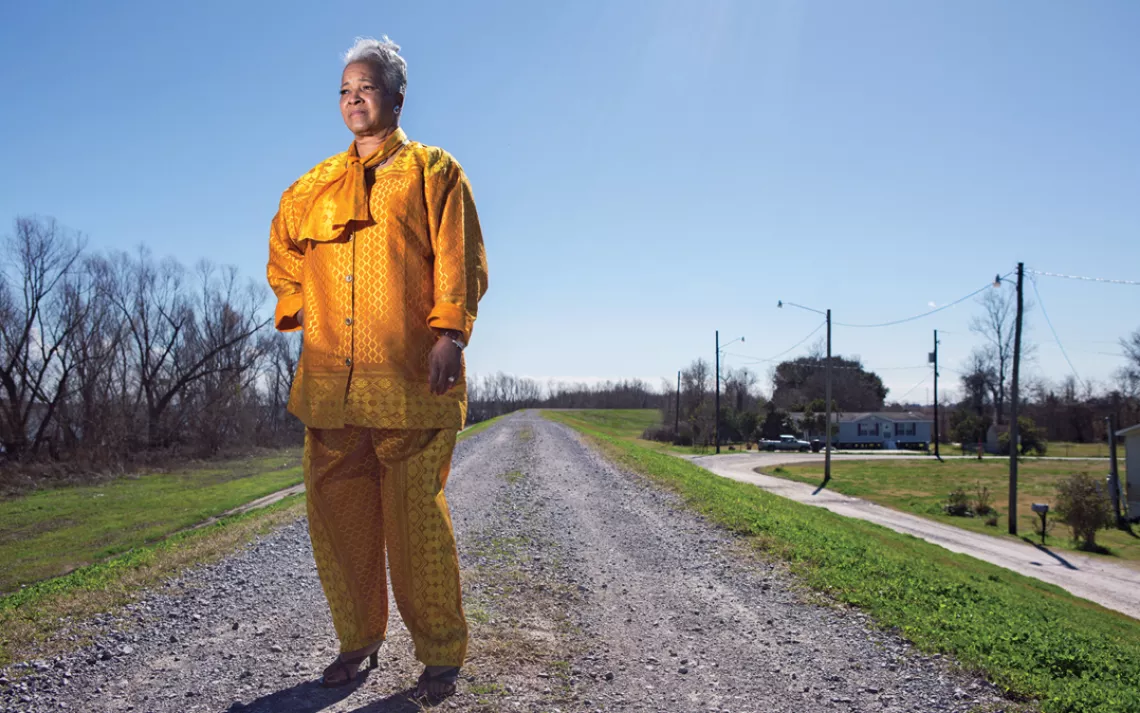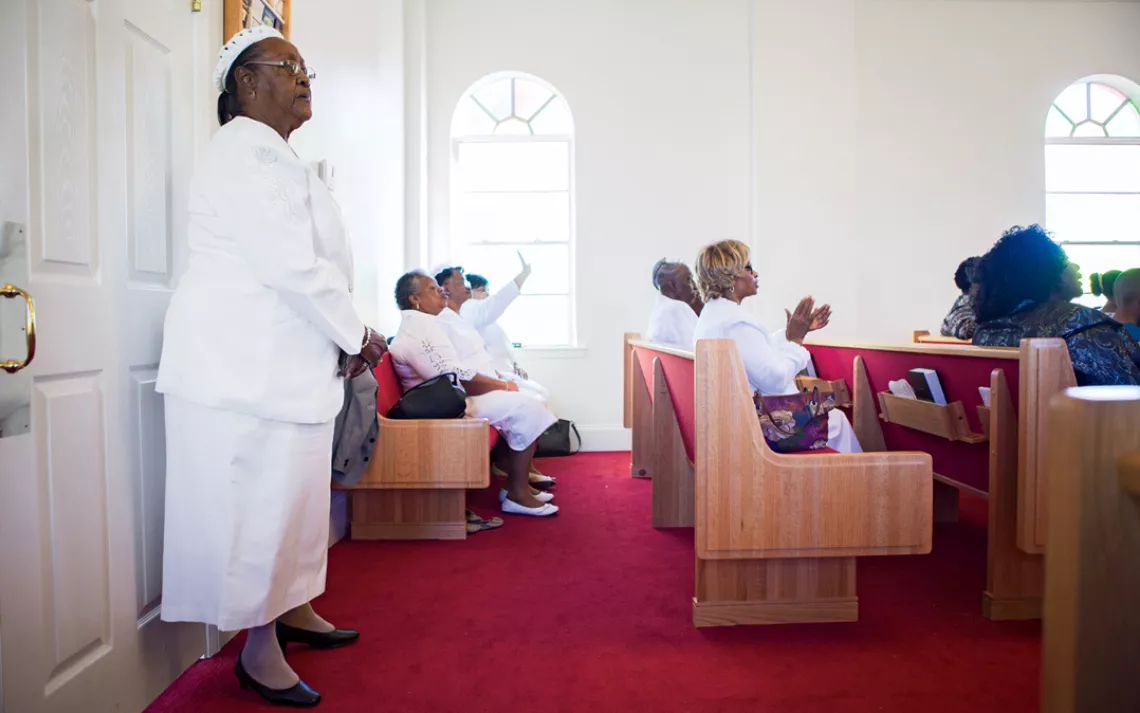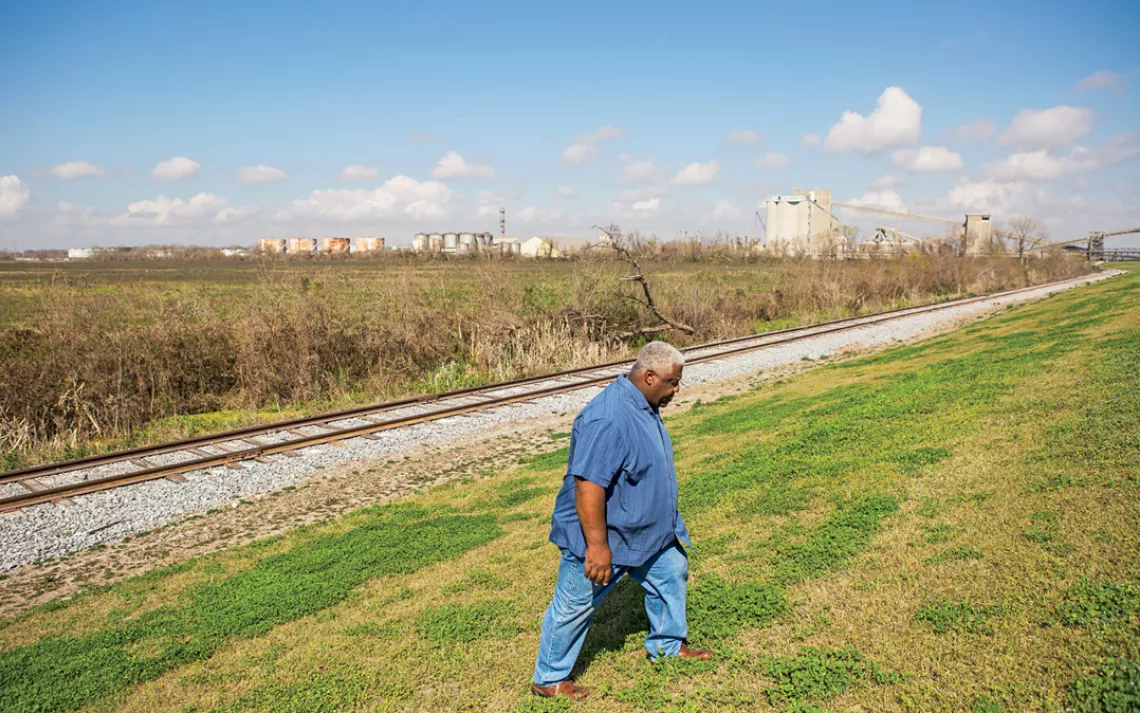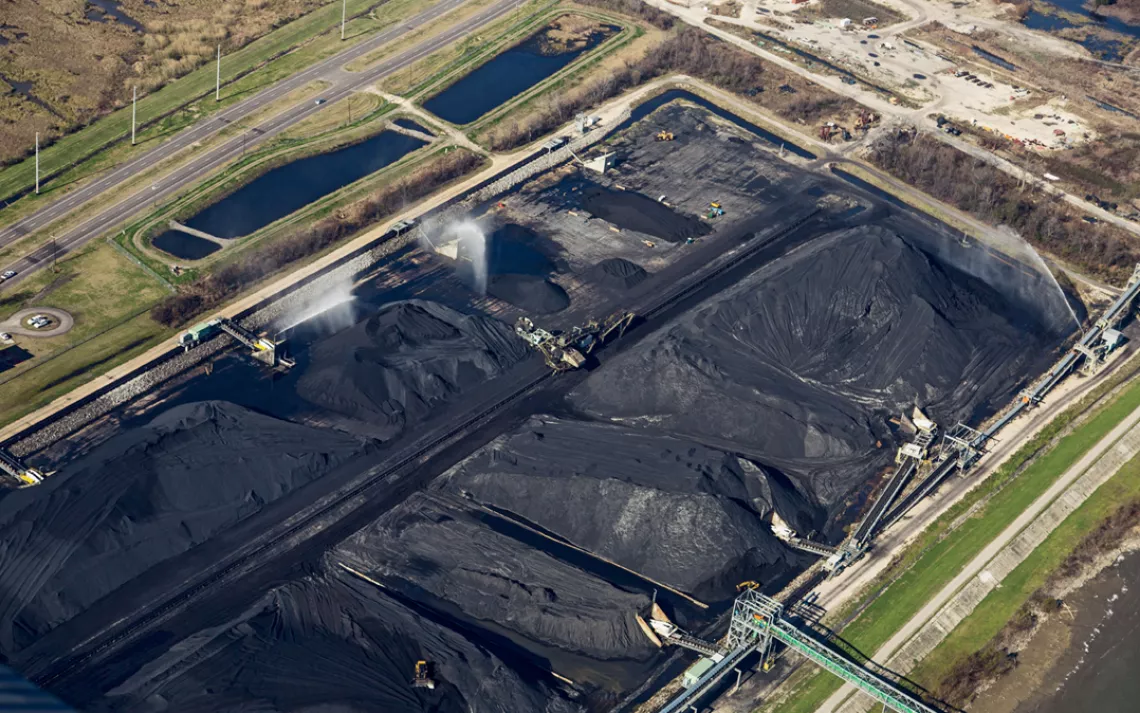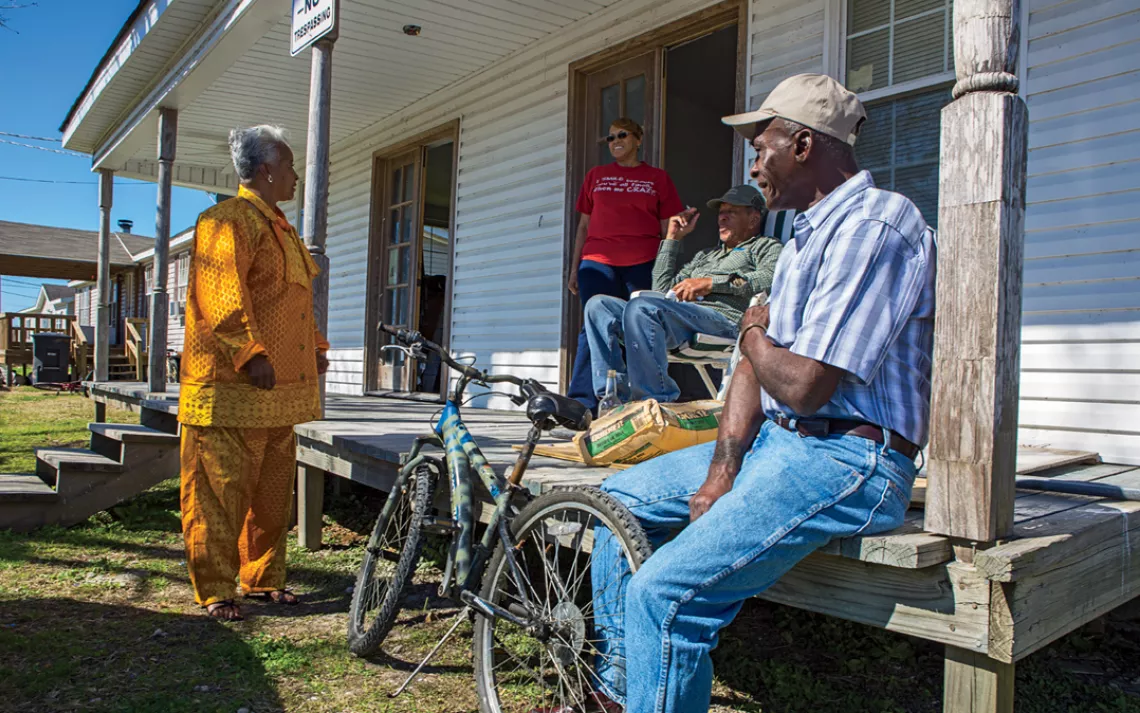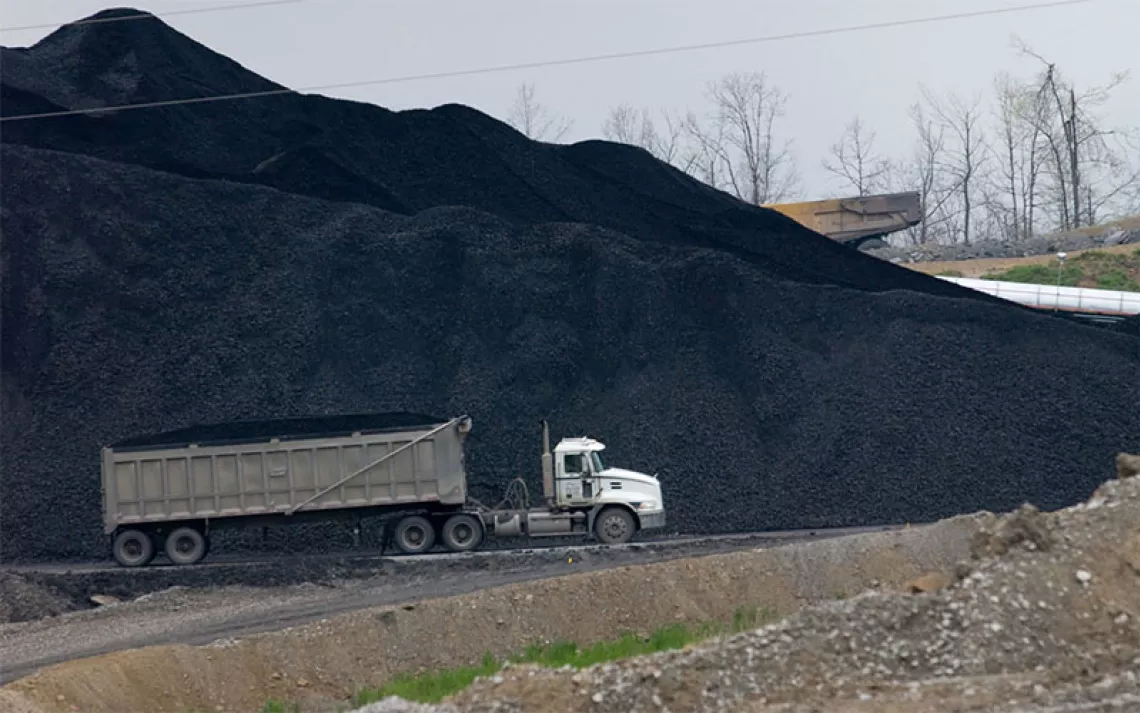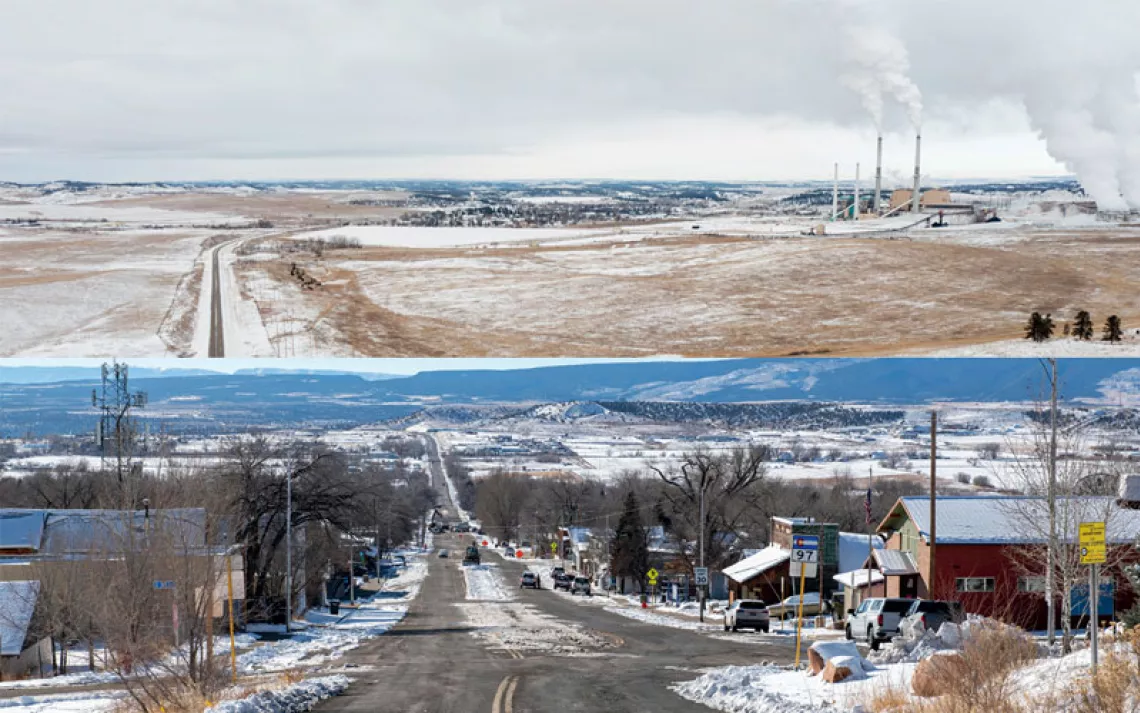Enough Is Enough: Ironton, Louisiana, Nixes New Coal Terminal
The tiny Louisiana town of Ironton already has two coal export terminals. The proposal to add a third has not gone well.
Photos by Kris Davidson
IT'S SUNRISE ON THE LORD'S DAY, and 30 miles south of New Orleans, in St. Paul Missionary Baptist Church, a choir is singing Zion songs to His holy and righteous name loud enough to muffle the humming of the nearby grain elevator and the passing tank trucks and the egrets that call ah-dub-blub-blub-blub as if they're gargling saltwater. Just outside the church, a barge packed with coal glides down the Mississippi River. In another 50 miles this great river will empty into the Gulf of Mexico, and the tree roots that rise like daddy longlegs along its shores will surrender to uninterrupted water.
Today the people of Ironton stop by St. Paul just to say thank you, Lord, for waking them up this morning and starting them on their way. In matching red sportswear, the gospel choir sings to Him who stretched His hands wide, whose blood came streaming down.
Now the good Reverend Haywood Johnson ascends to the pulpit. He is a man who stutters, except when delivering a sermon. "If anyone is blessed," the reverend says, "I know that Ironton is." Ironton is a three-block town of about 150 people that was founded by freedmen in the late 18th century, back when its surrounding marshes grew sugarcane. Today, with a quarter of the nation's energy supply passing through coastal Louisiana, the sugarcane is gone, replaced by an oil refinery, an oil tank farm, and two coal export terminals—all within five miles of Ironton. The closest terminal, Kinder Morgan's International Marine Terminal, recently doubled its capacity from 10 million to 20 million tons of coal per year. Now RAM Terminals LLC plans to open yet another export facility that will see coal off to Asia, Europe, and South America. RAM hopes to build right next to Ironton.
Like many men in Ironton, the reverend works at the nearby oil refinery, the ConocoPhillips. Maybe he's like the gruff guys I run into at lunchtime in the Cajun Kitchen on Highway 23, who scrape mud off their work boots on the railing outside while making it known that the first thing they're gonna do after work is plant a $100 bill in the ground and see if a tree comes up. But that's not the man I hear at the pulpit. "They wanted to put another coal terminal in," he says. "But God said, 'No!' God stepped in."
ALSO STEPPING IN WAS Miz Audrey Trufant-Salvant, who campaigned against the coal terminal and was subsequently elected to the council of Plaquemines Parish, Louisiana's southernmost county. She became the council's first Ironton resident—and its first African American woman.
Though everybody in Ironton identifies as black, most of the 23,000 residents of Plaquemines Parish are not. That includes many residents of Myrtle Grove, a new development of pastel-painted mansions—"fishing camps," some rich folks call them—just a mile away from Ironton and one of the stops on Trufant-Salvant's 2014 door-to-door election campaign. Some Myrtle Grove residents actively supported Trufant-Salvant's fight against the terminal, and it's likely that many wound up voting for her. Yet when she approached their houses unannounced last year, she did notice how gingerly they peeled back their curtains.
When I knock on her door one January evening, Trufant-Salvant has just returned from her granddaughter's basketball game and is watching the second half of an NFL divisional playoff.
"When I was coming up, we had one television, and I wanted to look at this channel, and my brothers wanted to look at that one. I had six brothers, so there was a fight every night," she says with her shoulders back, pewter hair combed up, one eye on me and the other on the TV, where Broncos running back C.J. Anderson keeps it fourth and one instead of fourth and forever. "I mean we had real fights, not just a little wrestling on the floor. And I would always win."
Virginia Trufant, Trufant-Salvant's cousin from a block over, will later say the same thing: "She would always win. Always had an opinion. Sometimes it got on your nerves!"
On January 8, Trufant-Salvant arrived at her first Plaquemines Parish meeting as a councilwoman determined to win—to deny RAM Terminals LLC its construction permit. In this parish notorious for its backdoor deals and muddled agreements with the oil and coal industries, she insisted on lining up the votes at that very first meeting, before, as she puts it, somebody got to the other six new council members and changed their minds "for a dollar." Six Ironton residents and several activists with the Sierra Club and the Gulf Restoration Network spoke at the meeting. These included Ironton's own Joyce Cornin, who, says Trufant-Salvant, "pushed her walker up to the podium all the way from the back of the building, making these little steps," and impressed on the council that enough was enough.
THAT TERMINAL. RAM Terminals LLC already owns a square mile of land that abuts Ironton. The terminal itself would be as big as Disneyland, and less than a mile from the church. "Remember, this community has been here some 200 years," Wilkey DeClouet tells me.
"No, over 200," Pearl Sylve corrects DeClouet in the church's kitchen, where they convene over foam cups of sweet coffee. "And we already have a coal terminal, and it's intolerable."
When the wind blows from the east, black soot from the existing terminal's two-story-high coal piles sprinkles over Ironton. As a girl, Trufant-Salvant used to hang her clothes outside to dry, but "now, if you hung a bright sheet, you'd get yourself a black sheet back." DeClouet has gotten into the habit of buying air filters with lifetime warranties, because after a few days his household filters get so dusty they feel like sheep wool. "We're inhaling all this stuff every day. Every day," Trufant-Salvant says. "And we're going on with our lives, because what else are we going to do? But we know it's definitely not healthy for us." DeClouet's wife didn't make it to church today because she's sneezing again, taking Zyrtec. Trufant-Salvant's brother has asthma. Both of Cornin's nieces had to be put on nebulizers when they were born, and her daddy died of cancer. DeClouet's parents, too.
A couple weeks before Trufant-Salvant's first council meeting, the proposed terminal seemed to be a sure thing. At the parish's December meeting, just one councilman vocally opposed the terminal. RAM Terminals LLC had all its ducks in a row, including a coastal use permit issued by the Louisiana Department of Natural Resources (DNR). Contractors had flattened the grass on the proposed riverfront site, and they were poised to break ground.
Then, at the January council meeting, a sun-break: Encouraged by the council's six new faces, Trufant-Salvant called the construction permit to a vote. Another new council member tried to stop her. "That councilman said, 'Well, I would just respectfully ask Councilwoman Salvant to defer the vote until I can get a closer look at the matter,'" Trufant-Salvant remembers. "And I said, 'Well, Councilman, respectfully, I understand that you, being a new person, you might not be knowledgeable about what exactly would have gone on here if that terminal came, but, myself, I live in a neighborhood adjacent to a coal terminal, and Councilman, I'm not about to defer. These folks, they need peace of mind, and I'm not going to prolong their pain. I'm calling it to question now, respectfully so.'" When Trufant-Salvant made out the results on the board--eight against the terminal, zero for, one abstaining—she was happy as the Lord.
When I met with Trufant-Salvant the morning after the meeting in a stately brick government building some 20 miles south of Ironton, she appeared with a full smile, a bright violet blouse, and a matching manicure, and—even though the Christmas poinsettias at St. Paul were still out, and the citrus sellers along Highway 23 were sorting red navels in woolen mittens at the tail end of their growing season—that day really did feel like a new year in Plaquemines Parish.
TRUAFANT-SALVANT'S VICTORY CAME on the heels of another: On New Year's Eve, Ironton residents received word that, as a result of a lawsuit brought by the Sierra Club and Cornin, among others, a district judge had invalidated the coastal use permit issued by the Louisiana DNR. So, in less than two weeks, the terminal lost two of its necessary permits. Judge Kevin Conner ruled that the DNR had failed to "investigate alternative sites." The site that the DNR signed off on not only abuts Ironton but also may have taken the place of a planned coastal restoration project, the Mid-Barataria Sediment Diversion. The diversion would breach the Mississippi's riverbank, creating a controlled flood designed to save Louisiana from sinking into the Gulf.
Over the past century, the state has lost a chunk of land the size of Delaware. The levees that hold back the Mississippi River and prevent flooding also prevent the buildup of sediment. Without muddy water washing over its banks from time to time, the river can't deposit alluvium—the clay, silt, and sand that solidifies into land. If the state goes ahead with the diversion, the project is expected to create about 50 square miles of land in 50 years. Without it, scientists expect that much of the coast below New Orleans will slide into the sea within a century, sending Ironton out for a long swim.
Sometimes the people of Ironton talk about the terminal by talking about everything other than the terminal. Take, for example, Betty Wilson, who calls me in from her screened-in porch and then greets me and my camera just as my grandmother would—"But I don't have my teeth in!"
I ask about the terminal. Wilson responds with a chronological list of hurricanes. "Then was it Katrina, or was it another storm? Must have been Betsy. Or Camille. Camille came after Betsy." Either way, the water met the church kitchen's freezer handle, and many Ironton residents still haven't received federal funding to cover Katrina damages. Even the insurance companies hesitate to pay up. One time an insurance inspector phoned Wilson and said, "According to your report, you had a whole lot of towels." She said to him, "Yes, I'm a towel freak. I love towels. They were from the top of my trailer to the floor; that's how many towels I had." In her exasperated voice I can hear Cornin's pronouncement: "Enough is enough."
AS A KID, WILKEY DECLOUET hauled water from the Mississippi River along the levee back to town. There the water sat in open cisterns that collected bird droppings, insecticides from the crop dusters, and funky "wiggle worms" that made the kids squirm when they drank. This was back during the days of the infamous Leander Perez, the political boss who ruled this parish for much of the 20th century and enthusiastically pocketed $80 million of the parish's oil royalties. As recently as 1980, Perez and his like-minded sons denied Ironton basic infrastructure like running water. Perez had appeared on Firing Line in 1969, a cigar between his lips, saying, "The negro is inherently immoral." He was the voice of bigotry, a man so racist that he was excommunicated by the Catholic Church.
It was in Perez's shadow that Trufant-Salvant took to playing all the sports in high school—softball, basketball, volleyball. In her first year, she says, "they wouldn't give me the Miss Athlete award because they wanted this white girl to have it. I told the coach, 'But I'm scoring all the baskets!' This wasn't just me being arrogant. You know, I really was scoring. I said, 'If you're gonna give her this accolade, she better win the games for us.' Well, in 10th, 11th, and 12th grades, I got Miss Athlete." And Trufant-Salvant vowed she would never tolerate another Perez.
Then came Billy. That's Billy Nungesser, Plaquemines Parish president from 2007 through 2014. Many of the people of Ironton just call him Billy, even though they politely precede everyone else's name with a personal title—Miz or Mister. Billy is "the man who stood in this church, right here, and put on a Christian face," as DeClouet puts it.
"And then, to get the terminal in, he tried to get us to get up and move! Told us to head south!" Cornin adds. "I don't intend on going further down. I'm down far enough."
Under Billy's administration, the council did not listen attentively to the voters, and, according to Trufant-Salvant, they sure didn't listen to the one black council member, Burghart Turner. "He would have to actually wave to get their attention," says Trufant-Salvant, who worked for Turner in his last term. "He would take the floor, and that would be the time the rest of the council would get up and get their snacks." Those were Trufant-Salvant's crying days. Every meeting, every other week, she left in tears.
SEVERAL DAYS AFTER THAT FIRST council meeting, Ironton's air turns muggy, mosquitoes show up, and in their stories the people of Ironton keep turning up their past. Some of the glow of the recent victory seems to have worn off. Atop an unmarked tomb in one of the town's two cemeteries, a young man and his grandfather skin a rabbit for lunch. Meanwhile, under a sweet gum tree, a haughty cat prances with a mouse in its mouth. The grandson sees me eyeing the cat. "Somebody's always eating somebody," he muses. "Isn't that it?"
The activists of Ironton worry that the RAM terminal proposal isn't gone for good. "These construction proposals are the undead," says Devin Martin, the Sierra Club organizer who helped coordinate Ironton's first town hall meeting concerning the terminal at St. Paul back in 2012. "This vampire will keep coming back." RAM Terminals LLC can still appeal Judge Kevin Conner's decision. (The company declined comment for this story.) The coal guys can also woo the new Plaquemines Parish council and then reapply for a construction permit. And they can take heart from the fact that the Coastal Protection and Restoration Authority, the state agency charged with implementing the Mid-Barataria Sediment Diversion, still supports the terminal—and that one of its board members is who else but Billy.
DURING HURRICANE KATRINA, some townspeople worried that the aboveground tombs in Ironton's cemeteries would wash away. If that happened, would people forget the chapters of their histories that weighed them down like boots taking on water? Some of the oldest tombs did shift, but the people of Ironton put them back into place. Trufant-Salvant can still visit the white mausoleum of her great-great-great-grandfather Seth Trufant, born in 1805 and entered into eternal rest in 1888, the white man who impregnated his black mistress.
In that same cemetery, Trufant-Salvant can also still visit her father, James Stanley Trufant Sr., who, she says, "refused to work a government job in Plaquemines, because if you worked for this parish and were black, you were controlled by Perez." So all his life he worked as a longshoreman in New Orleans.
Trufant-Salvant's mother, Mary Griffin-Trufant, had a different approach. "She stood on the front line of every issue—drinking water, schoolbooks, whatever—and I just watched her and did pretty much what she did." Her mother didn't get much backlash from Perez, because "you only get backlash when you effect change, and my mom's generation didn't have the power to do that. My mom had an eighth-grade education. She was just causing enough noise until the younger people like myself could come along and put teeth to it."
At the beginning of her first parish council meeting, while the other council members rearranged papers and overcoats, Trufant-Salvant quietly teared up behind her desk. "I thought about my mom, my dad, thought about so many other people involved in the fight who weren't there to see little me sitting in that council seat," she says. "So I sat there for a moment with them, trying to get my composure." Then Councilwoman Trufant-Salvant called the vote.
This article was funded by the Sierra Club's Beyond Coal campaign.
What You Can Do
Louisiana has more than its share of petrochemical pollution. Sign the petition at sierraclub.org/stopcoal trains to limit coal export facilities.
 The Magazine of The Sierra Club
The Magazine of The Sierra Club
